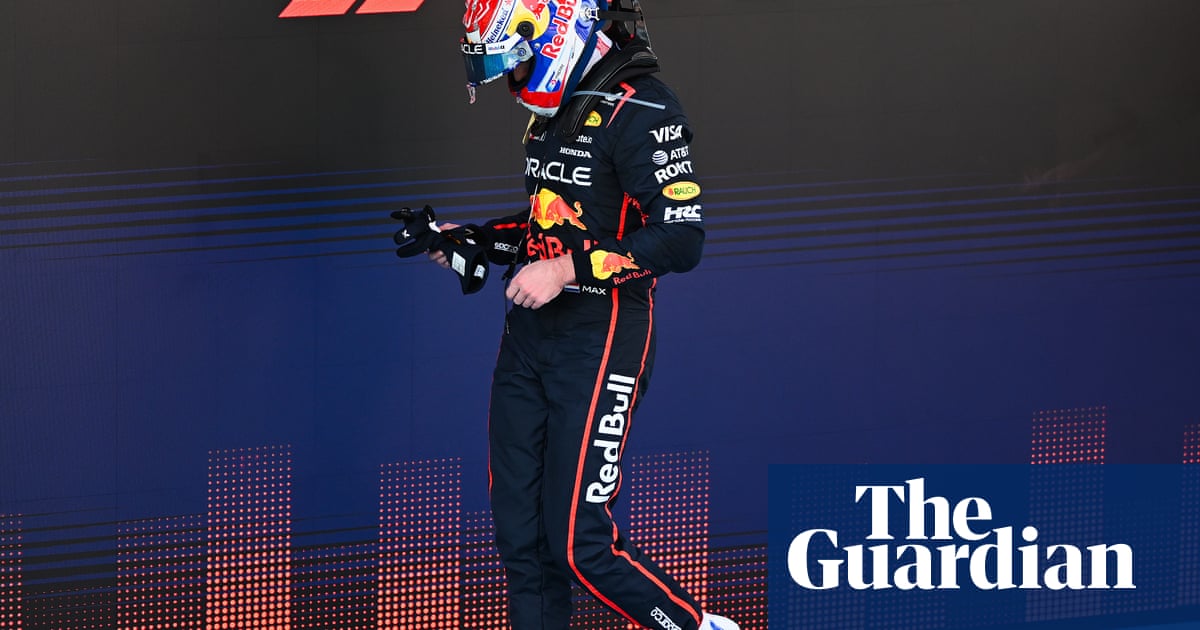There was no justification for Max Verstappen’s rash and futile act of retribution at the Spanish Grand Prix, when he deliberately drove into the side of George Russell’s car. The world champion knows it and on Mondayhe admitted as muchwith something of a mea culpa on social media. Yet it also must be considered that it is part and parcel of what makes Verstappen so competitive, albeit in this case in an entirely unedifying and self‑defeating fashion.
Angry and frustrated at a sequence of events in Barcelona, including having to cede a place to Russell, Verstappen surrendered to his baser instincts. Having pulled over to give the place to Russell, he clearly then felt a point had to be made and accelerated back up the inside to collide with the Mercedes.
He took a 10-second penalty, dropping him to 10th, putting him 49 points behind the championship leader Oscar Piastri, with three points added to his licence. One more penalty and he will receive a one-race ban.
He conceded on Monday that he was “frustrated”, his emotions were running high and that the move was “not right and shouldn’t have happened”.
Clearly he had had time to cool down and gain some perspective from what was a moment of madness, but even given the chain of events – which were hardly rage-inducing stuff – this was still shocking from an F1 veteran at 27 years old and a four‑time world champion.
It was the purposeless anger that really caught the eye, rather than the severity of the action itself.
The Mercedes team principal, Toto Wolff, described it as “incomprehensible” and his interpretation of it in the immediate aftermath bears repeating. “The great ones, whether it’s in motor racing or in other sports, you just need to have the world against you and perform at the highest possible level,” he said. “That’s why sometimes these greats don’t recognise that actually the world is not against you, it’s just you who has made a mistake or you’ve screwed up.”
Verstappen has displayed this attitude in the past, while hisRed Bullteam have at times positively cultivated the “us‑against‑the‑world” stance, with their contention they have never been quite taken seriously because they are backed by an energy drink manufacturer.
Verstappen has also been clear in the past that he believes the rules around overtaking are over‑prescriptive and this too doubtless fed into his frustration. He was similarly aggrieved in Mexico last season when he was penalised twice for two rash manoeuvres on the same lap against Lando Norris. “What is allowed, what isn’t, is not very natural,” he said on Sunday, in reference to the regulations.
Even given that antipathy, it is hard not to sense that the driver who can be as controlled and composed as they come, who will grind out a result from nowhere, who has been dragging his recalcitrant car by the scruff of the neck to the front of the grid this season, can sometimes simply succumb to a base, emotive response that is really beneath him but which he cannot seem to quite suppress.
That is disappointing, because Wolff is also correct in identifying Verstappen as one of the greats. He may be flawed but he is without doubt an exceptional driver, a generational talent. His uncompromising attitude, drive and competitive spirit inform part of what makes him so good and so hard to beat – but on Sunday those attributes went unrestrained to his cost.
The Dutchman shares those ultra‑competitive traits with others, perhaps notably Michael Schumacher and Ayrton Senna, but there is also a fundamental difference. When Schumacher ruthlessly and deliberately clashed with Damon Hill at Adelaide in 1994 and then Jacques Villeneuve at Jerez in 1997, he had a specific purpose in mind – the moves were with the intent of winning the world championship. Similarly, Senna taking out Alain Prost at Suzuka in 1990. Cynical, ruthless, ugly and unsportsmanlike, without doubt, but notably with purpose.
Nigel Mansell recalls that Senna’s uncompromising attitude was aimed expressly at intimidating other drivers. Verstappen’s wild lunge at Russell in Spain was none of these things. It served no end other than to vent his own anger and has left his title hopes hanging by the slenderest of threads.
Worse still it coloured what has otherwise been an enormously impressive season in which he has stayed with the McLarens with immense determination and consistency, taking every opportunity and returning the maximum when he had none.
This moment of madness was a pointless flailing that rendered those efforts all but futile and while he maintains he was never really in the title fight, his fearsome efforts thus far this season belie that claim because for all the rightful opprobrium from Sunday, Verstappen is better and more than the driver who gave in to his emotions. His legacy as a potentially great champion depends on him proving that.
